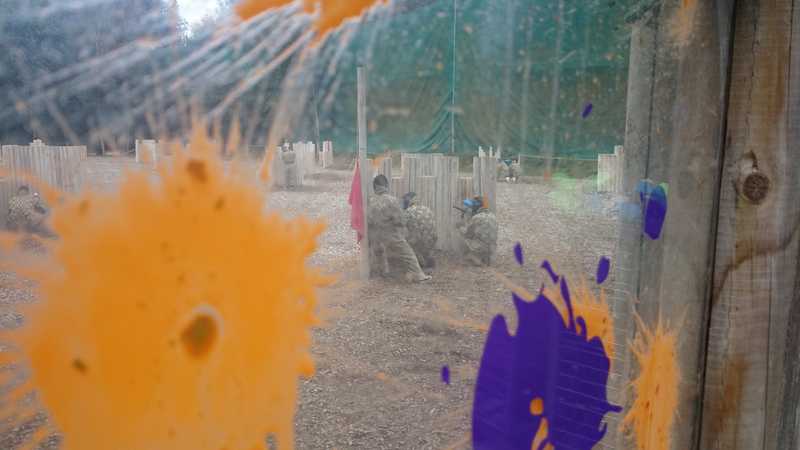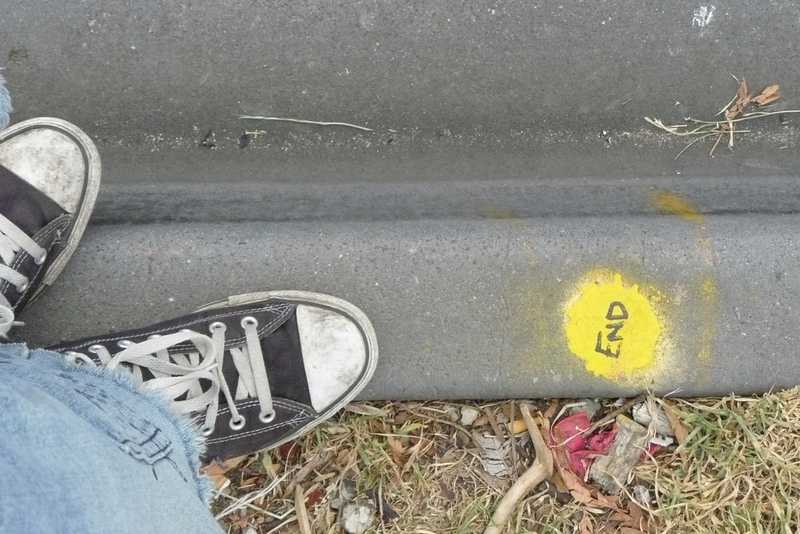I’m working on a new project playing with new kids in town: Rails 5.1, Webpack(er), Bootstrap 4, React, etc. I was working with forms when I realized that Bootstrap 4 needs a lot of conditional CSS class to show states. Concatenating strings in a view it does not produce a very nice code.
So I thought I could create a similar behavior replicating the
classNames node package:
model.valid?
=> true
class_string(:row, :promo, good: model.valid?, bad: !model.valid?)
=> "row promo good"
It concatenates all the hash’s keys whose value is truthy. For convenience, it also allows receiving an array for CSS classes that are always included. This is my helper’s implementation:
def class_string(*arr, **hash)
hash
.map { |css, bool| css if bool }
.compact
.concat(arr)
.map(&:to_s)
.join(" ")
end
Later, I found a bug in this method that amazed me. I believed I understood completely how the splats work in ruby, but his edge case it astonished me:
def splat_test(*array, **hash)
puts "array: #{array} ; hash: #{hash}"
end
splat_test(42, 'foo' => 'foo', baz: :baz, String => String, bar: :bar)
# array: [42, {"foo"=>"foo", String=>String}] ; hash: {:baz=>:baz, :bar=>:bar}

And this is the reason why I wrote this post. I have been investigating how the splats work in depth after discovering this code and now I want to share with you.
First I’ll explain the simple splat in detail,
including an unexpected benchmark result
updated: thanks to some comments I realized that the benchmark was not doing what I expected.
I will continue with every case that has come to my mind with the double splat
and the keyword arguments,
to see later why they aren’t the same as a hash argument.
Finally, I’ll try to explain why this code works in this way.
I will use several snippets from pry sessions.
For me, it is the best way to learn ruby,
hopefully, it is useful for you too.
The simple *splat
The simple splat works with arrays.
Ruby splat with methods
One of the main uses of the splats is to receive an undefined number of arguments:
def splat_arguments(*args)
args
end
splat_arguments(:linux, "ms", String)
=> [:linux, "ms", String]
splat_arguments(linux: :cool, arch: :very_cool)
=> [{:linux=>:cool, :arch=>:very_cool}]
It works with more arguments as well:
def splat_more_arguments(a, *args, c)
puts "a #{a} ; args #{args} ; c #{c}"
end
splat_more_arguments(:archlinux, :elementaryos, :gentoo, :ubuntu, :centos)
# a: archlinux ; args: [:elementaryos, :gentoo, :ubuntu] ; c: centos
splat_more_arguments(:archlinux, :centos)
# a: archlinux ; args: [] ; c centos
splat_more_arguments(:archlinux, [:elementaryos, :gentoo], :ubuntu, :centos)
# a: archlinux ; args: [[:elementaryos, :gentoo], :ubuntu] ; c: centos
splat_more_arguments(:archlinux)
# ArgumentError: wrong number of arguments (given 1, expected 2+)
You can avoid giving a name to the splat variable. This way you show your intention of not using those variables and it won’t be confused with a possible bug in the future:
def anonymous_splat_arguments(first, *, last)
[first, last]
end
anonymous_splat_arguments(:archlinux, :elementaryos, :gentoo, :ubuntu, :centos)
=> [:archlinux, :centos]
# Other interesting use
def inspected_method(*)
puts "before calling inspected_method"
super
puts "after calling inspected_method"
end
Ruby splat as parameters
It can be used to pass parameters from an array:
def splat_parameters(a, b, c)
puts "a: #{a} ; b: #{b} ; c: #{c} "
end
distros = [:archlinux, :debian, :redhat]
splat_parameters(distros[0], distros[1], distros[2])
# a: archlinux ; b: debian ; c: redhat
# Equivalent but easier to write
splat_parameters(*distros)
# a: archlinux ; b: debian ; c: redhat
splat_parameters(:archlinux, *[:debian, :redhat])
# a: archlinux ; b: debian ; c: redhat
Using splats with blocks
The previous points are also true for blocks:
def block_splat
yield(:linux, "ms", String)
end
block_splat do |*args|
p args
end
# [:linux, "ms", String]
def splatted_block
distros = [:archlinux, :elementaryos, :gentoo, :ubuntu, :centos]
yield *distros
end
splatted_block do |best, better, good, common, secure|
puts "#{best}, #{better}, #{good}, #{common}, #{secure}"
end
# archlinux, elementaryos, gentoo, ubuntu, centos
As you can see it works exactly in the same way.
Array destructuring with splats
The simple splat can be used outside the method definitions and calls. It can be used in assignments in a very analogous way:
distros = [:archlinux, :elementaryos, :gentoo, :centos, :ubuntu]
best, *rest, last = distros
puts "best: #{best} ; rest: #{rest} ; last: #{last}"
# first: archlinux ; rest: [:elementaryos, :gentoo, :centos] ; last: ubuntu
Updated: In a previous version of the article, I showed a “wrong” benchmark. Splat is not very performant technique. See comments for more information.
An astute reader may have realized that
it is not exactly the same as using first and last methods,
or [1], [2], [-1], [-2], etc.
For example:
first, *, last = [:a]
first
=> :a
last
=> nil
first = [:a].first
first
=> :a
last = [:a].last
last
=> :a
firstandlastare not always the same that using splats!
Sometimes using splats is cleaner and better to show your real intentions. Just remember to no name the splat variable, like the above example, for better performance if you don’t need it.
Flatten arrays with splats

I think this example is self-explanatory:
distros = [:archlinux, :elementaryos, :gentoo, :centos, :ubuntu]
more_distros = [:debian, *distros, :fedora]
=> [:debian, :archlinux, :elementaryos, :gentoo, :centos, :ubuntu, :fedora]
Wrap in an array with splats
Last but not least,
did you know splats can also replace the Array() method?
Array("string")
=> ["string"]
wrap = *"string"
=> ["string"]
wrap = *1
=> [1]
Array(nil)
=> []
wrap = *nil
=> []
var = "string"
wrap = *var
=> ["string"]
var = 1
wrap = *var
=> [1]
var = [1]
wrap = *var
=> [1]
var = nil
wrap = *var
=> []
But maybe it doesn’t do what you expected with a hash:
var = {a: :a}
wrap = *var
=> [[:a, :a]]
And with this wrap, we finished the simple splat. Let’s take a look at the double one!
The double **splat operator in Ruby
The double splat in Ruby works with hashes instead of arrays, but not with all of them like I thought.

Let’s see some examples:
def double_splat(**hash)
hash
end
double_splat(a: :a, b: :b)
=> {:a=>:a, :b=>:b}
hash = { a: :a }
double_splat(hash)
=> {:a=>:a}
Keyword arguments
This feature introduced in Ruby 2.0 is related to the double splat operator. You can define a method with keyword arguments, this means the parameters have a name. When you want to call a keyword argument method you have to name each argument:
def keyword_arguments(key_a: :default_a, key_b: :default_b)
[key_a, key_b]
end
keyword_arguments(key_a: :a, key_b: :b)
=> [:a, :b]
keyword_arguments(key_b: :b, key_a: :a)
=> [:a, :b]
As you can see, the order of the arguments does not matter, but calling this kind of methods is cumbersome. It may be nice for methods with a long list of parameters, however, this is usually considered a code smell.
But this is not the only feature. They were declared with a default value, you can use them:
keyword_arguments(key_b: :b)
=> [:default_a, :b]
keyword_arguments
=> [:default_a, :default_b]
You can use a hash with all the parameters:
hash = { key_a: :a, key_b: :b }
keyword_arguments(hash)
=> [:a, :b]
If you forget to name the parameters it will fail:
keyword_arguments(:a, :b)
# ArgumentError: wrong number of arguments (given 2, expected 0)
The errors are very difficult to understand, so they deserve their own section…
Double splat and Keyword argument Errors
The last error it seems very strange:
ArgumentError: wrong number of arguments (given 2, expected 0)
Why did it expect 0 when 2 arguments were defined?
The double splat argument and keyword arguments are special arguments in Ruby. You can check it with your ruby console and a little of introspection:
def simple_method(value)
value
end
Object.instance_method(:simple_method).parameters
=> [[:req, :value]]
def optional_method(value=3)
value
end
Object.instance_method(:optional_method).parameters
=> [[:opt, :value]]
def splat_method(*args)
args
end
Object.instance_method(:splat_method).parameters
=> [[:rest, :args]]
def double_splat_method(**args)
args
end
Object.instance_method(:double_splat_method).parameters
=> [[:key_rest, :args]]
def keyword_method(a_key: :value)
a_key
end
Object.instance_method(:keyword_method).parameters
=> [[:key, :a_key]]
def block_method(&a_block)
a_block
end
Object.instance_method(:block_method).parameters
=> [[:block, :a_block]]
The error message is confused because you don’t expect that a keyword argument isn’t an argument, but for Ruby, they are completely different kind of arguments.
Thus if you use regular values for double splat and keyword arguments Ruby complains:
double_splat_method(42)
# ArgumentError: wrong number of arguments (given 1, expected 0)
keyword_method("4, 8, 15, 16, 23, 42")
# ArgumentError: wrong number of arguments (given 1, expected 0)
Hash keys MUST be symbols!
I didn’t know this before creating this post and it was part of my initial confusion. If you use a hash with no symbol keys, they aren’t used by the double splat and keyword arguments:
keyword_method("a_key" => "value")
# ArgumentError: wrong number of arguments (given 1, expected 0)
keyword_method(a_key: "value")
=> "value"
double_splat_method("a_key" => "value")
# ArgumentError: wrong number of arguments (given 1, expected 0)
double_splat_method(a_key: "value")
=> {:a_key=>"value"}
Hash MUST contain exactly the same keys
If you pass more keys than the defined in a keyword arguments method Ruby fails again:
keyword_method(a_key: "value")
=> "value"
keyword_method(a_key: "value", other_key: "666")
# ArgumentError: unknown keyword: other_key
hash = { a_key: "value", other_key: "666" }
keyword_method(hash)
# ArgumentError: unknown keyword: other_key
To avoid this kind of errors, you can use the anonymous double splat operator:
def keyword_arguments_no_crash(key_a: :default_a, key_b: :default_b, **)
[key_a, key_b]
end
invalid_hash = { key_a: :hash_a, key_b: :hash_b, key_c: :hash_c }
keyword_arguments_no_crash(invalid_hash)
=> [:hash_a, :hash_b]
In fact, you can give it a name and use it in the method:
def keyword_arguments_plus(key_a: :default_a, key_b: :default_b, **plus)
[key_a, key_b, plus]
end
invalid_hash = { key_a: :hash_a, key_b: :hash_b, key_c: :hash_c }
keyword_arguments_plus(invalid_hash)
=> [:hash_a, :hash_b, {:key_c=>:hash_c}]
Mandatory keyword arguments
Since Ruby 2.1, it is allowed to not add a default value to the arguments. In this case, the argument is mandatory:
def mandatory_arguments(mandatory:)
mandatory
end
mandatory_arguments
# ArgumentError: missing keyword: mandatory
mandatory_arguments(mandatory: :learn)
=> :learn
It can be combined with the double splat to make some arguments optional and another mandatory:
def configuration(db:, **other_options)
puts "db: #{db}, other_options: #{other_options}"
end
configuration(db: :postgres)
# db: postgres, other_options: {}
configuration(pool: 5)
# ArgumentError: missing keyword: db
configuration(db: :postgres, pool: 5)
# db: postgres, other_options: {:pool=>5}
conf = { pool: 5, db: :postgres }
configuration(conf)
# db: postgres, other_options: {:pool=>5}
As you can see, Ruby splits the hash for you, making the code easier to read and to work with.

The double splat operator & destructuring hashes
Finally,
you can combine keyword arguments and hashes using the double splat operator.
It will be similar to use the merge method:
my_options = { logger: :stdout }
configuration(my_options.merge(db: :mongodb))
# db: mongodb, other_options: {:logger=>:stdout}
configuration(db: :mongodb, **my_options)
# db: mongodb, other_options: {:logger=>:stdout}
Using double splats with blocks
All the previous points can also be applied to the blocks in Ruby:
def block_double_splat
yield(kernel: :panic)
end
block_double_splat do |**args|
p args
end
# {:kernel=>:panic}
def double_splatted_block
distros = { best: :archlinux, common: :ubuntu }
yield distros
end
double_splatted_block do |best:, **|
puts "The best is #{best}"
end
# The best is archlinux
Why double splat when the last argument could be a hash?
Do you remember that the double splat argument is not a regular argument? This causes strange message errors when the arguments are not expected, but you can also use it to take advantage of it:
def using_double_splat(*args, **hash_args)
hash_args
end
def no_using_double_splat(*args, hash_args)
hash_args
end
using_double_splat(7, 13, daenerys: :targaryen)
=> {daenerys: :targaryen}
no_using_double_splat(7, 13, daenerys: :targaryen)
=> {daenerys: :targaryen}
This seems to be the same behavior, but it is different when you don’t pass a hash as the last argument:
using_double_splat(7, 13)
=> {}
no_using_double_splat(7, 13)
=> 13
So, if you need the last argument to always be a hash, the double splat operator in the definition is the way to go.
The strange behavior of the beginning
This was the code:
def splat_test(*array, **hash)
puts "array: #{array} ; hash: #{hash}"
end
pry(main)> splat_test(42, 'foo' => 'foo', baz: :baz, String => String, bar: :bar)
array: [42, {"foo"=>"foo", String=>String}] ; hash: {:baz=>:baz, :bar=>:bar}

My first mistake was thinking that the double splat operator captures all pairs key-value of the last hash. However, as we have seen before double splat operator only captures symbol keys!
Ruby interprets the call of the method more or less in this way:
-
42: is a number and it will be the first element of the splat*array. -
'foo' => 'foo': the key is not a symbol, it is a string, this means it cannot be added to the keywordhash. Hence it adds the couple key-value to the second element of the*array. This second element is, of course, an array. -
:baz => :baz: ruby finds a new couple key-value. This time the key is a symbol (:baz) and it is added to the keywordhash -
String => String: the key is not a symbol, it is a class. It cannot be added to the keywordhash. So ruby instead of complaining, cleverly (maybe too cleverly for my taste), it adds it to the splattedarray. Instead of being added to a new hash at the third position, it is merged with the second and last element in thisarray. For me, it is clearly an unexpected behavior. -
:bar => bar: This time the key is a symbol. It is added to the keywordhash.
Ruby does not oppose to this bizarre syntax, it allows you mix keys of all types and they are added to the “right” variable on the fly. Ruby is literally splitting our last hash argument into two different hashes, depending on the type of the key.
Conclusions
Congratulations if you reach until here :) This was a big review of splat features in Ruby. Hopefully, you learned something new among all the code snippets.

The last part of this post, Ruby splitting the hash, is a curious feature. I can see the point because the keyword argument must have symbol keys, and it can be very useful as last optional argument. On the other hand, it is not very intuitive and it has to be used with caution. A future programmer may not know all the difficulties of splats in Ruby and bugs can easily introduce.
And what do you think about splat? Did you see something that surprised you?



Leave a Comment